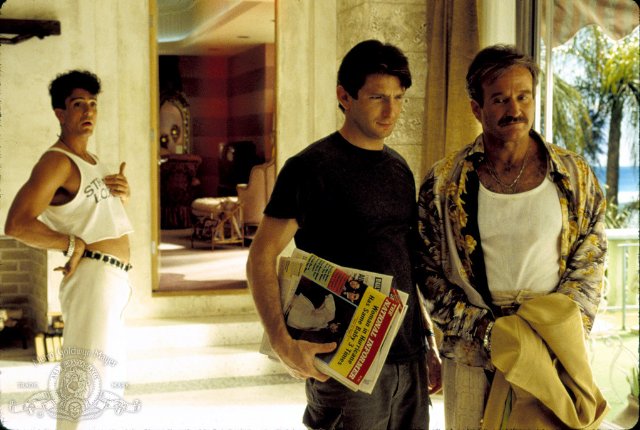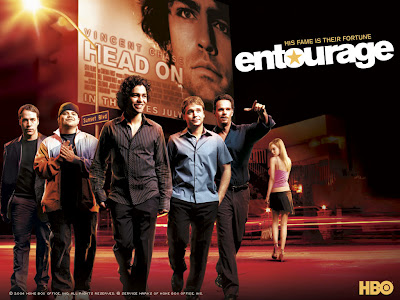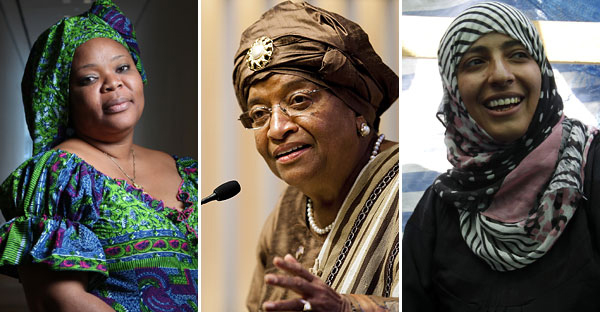 |
| Dianne Weist as Louise, Hank Azaria as Agador, Christine Baranski as Katherine, and Gene Hackman as Senator Kevin Keely in The Birdcage |
This is a guest review by Candice Frederick.
The setup: Robin Williams plays gay cabaret owner Armand Goldman, whose life partner is Albert (Nathan Lane), one of the must-see acts down at their drag queen hot spot in Miami, The Birdcage. Armand’s 20-year-old son Val (Dan Futterman) has announced that he’s engaged to be married to his teenage sweetheart, Barbara (Calista Flockhart), and must introduce his dad to her conservative parents, right-wing Senator Kevin Keeley (Gene Hackman) and his wife, Louise (Dianne Wiest). The politician and his wife would be in for an unwelcomed shock, if Armand and Albert hadn’t finally come up with the fool-proof plan to have Albert pose as Armand’s wife (in drag).
The scene: Val is with his dad Armand, fretting over having Albert involved in the farce at all as Albert is apparently far too flamboyant to pull off anything other than the performance du jour over at The Birdcage. As Val continues to fret over it, and exchange a few worries with his father, his insecurities begin to show and some of his comments come off unintentionally insensitive. And Albert just so happens to come in on the tail end of Val’s tantrum:
Oh yes, another jibe, another joke at my expense. You were probably laughing at me with Katherine, too. Well, why not? I’m not young, I’m not new, and everyone laughs at me. I’m quite aware of how ridiculous I am. I’ve been thinking that the only solution is to go where no one is ridiculous and everyone is equal. Goodbye, Armand.
 |
||
| Nathan Lane as Albert and Robin Williams as Armand in The Birdcage |
Their abnormality, so to speak, lies in the fact that they are two of the more modern gay male characters, whose sole purpose isn’t simply to enter the scene as the punch line in a mostly straight guy-focused film. Sure, they’re hilarious, their dance moves are enough to make both Beyoncé and Britney Spears blush, and you need a scalpel to remove the amount of makeup Armand has on his face (as Val points out in the movie). But, most importantly, you know their stories. They’re not just the gag.
You do an eclectic celebration of the dance! You do Fosse, Fosse, Fosse! You do Martha Graham, Martha Graham, Martha Graham! Or Twyla, Twyla, Twyla! Or Michael Kidd, Michael Kidd, Michael Kidd, Michael Kidd! Or Madonna, Madonna, Madonna!… but you keep it all inside.
 |
|||
| Nathan Lane as Albert in The Birdcage |
It shouldn’t come as much of a surprise to learn that The Birdcage held the highest weekend opening gross with an openly gay male lead for thirteen years until 2009’s Brüno. It’s entertaining, tongue-and-cheek, smart, and fully aware of itself.
 |
| Hank Azaria as Agador, Dan Futterman as Val, and Robin Williams as Armand in The Birdcage |
Yes, I wear foundation. Yes, I live with a man. Yes, I’m a middle- aged f*g. But I know who I am, Val. It took me twenty years to get here, and I’m not gonna let some idiot senator destroy that. F&*k the senator, I don’t give a damn what he thinks.
The Birdcage is a little film with knee-slapping scenes coupled with thoughtfully acute moments as well. It doesn’t aim to change the perception of gay culture, but it offers a look into one gay family by putting them into an extraordinarily futile situation indicative of exactly what the characters fight against. You see why they’ve created The Birdcage, where everyone can come as really they are and fit right in.






